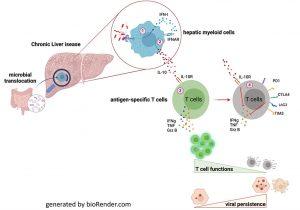Chronic liver disease patients are more susceptible to viral illnesses and do not react to vaccinations. These individuals have defective virus-specific T cells that cannot get rid of viral infections. Researchers have identified the molecular process underpinning the suppression of T-cell defence in a recent investigation. (Figure 1).
In individuals with chronic liver disease, the researchers were able to demonstrate that the targeted inhibition of a specific immune receptor can restore the immune responses to immunisation against Hepatitis B and COVID-19.
In addition to directly affecting liver processes, chronic liver disorders (CLD), such as liver cirrhosis and fibrosis, also have the following effects: Patients are more vulnerable to virus illnesses, which are frequently untreatable and can cause life-threatening illness. Additionally, individuals with CLD respond poorly to immunisation.
The gut microbiota frequently undergoes a pathological shift in conjunction with chronic liver illnesses. As a result, the gut’s protective barriers become more vulnerable, allowing germs to eventually infiltrate the bloodstream and the liver. The liver’s immune cells are stimulated by the translocated bacteria, which also causes the production of type I interferon. (IFN-I). This naturally occurring messenger particle serves as an alert for the liver’s neighbouring immune cells. The researchers were able to demonstrate in this work that a targeted neutralisation of IFN-I and IL-10 results in the restoration of T cell protection against viral infection.
The research emphasises the critical function of gut-liver axis and microbiome in the inhibition of antiviral immune functions.
Journal article: Hackstein. C. P., et al., 2023. Interferon-induced IL-10 drives systemic T-cell dysfunction during chronic liver injury. Journal of Hepatology.
Summary by Stefan Botha











